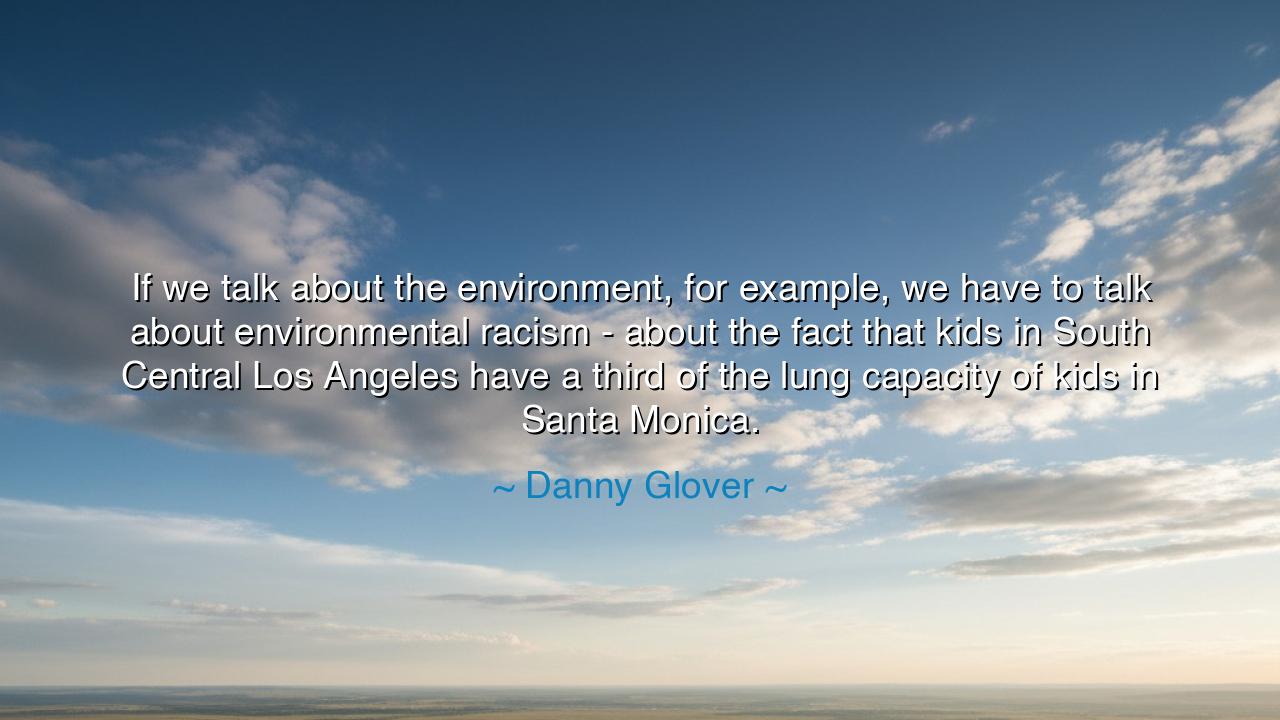
If we talk about the environment, for example, we have to talk
If we talk about the environment, for example, we have to talk about environmental racism - about the fact that kids in South Central Los Angeles have a third of the lung capacity of kids in Santa Monica.






Hear the piercing words of Danny Glover, spoken with the weight of justice and compassion: “If we talk about the environment, for example, we have to talk about environmental racism – about the fact that kids in South Central Los Angeles have a third of the lung capacity of kids in Santa Monica.” In this declaration, the veil is torn away, revealing that the wounds of the earth do not fall equally upon all its children. For the burden of pollution, of poisoned air and toxic soil, too often rests on the shoulders of the poor and marginalized, while the wealthy breathe freely.
To speak of environmental racism is to name an ancient injustice in modern form. It is the reality that communities of color, the working poor, and the powerless are placed near factories, highways, waste dumps, and poisoned rivers, while wealthier, whiter neighborhoods enjoy clean parks and safe water. The earth itself becomes divided along lines of privilege, and the bodies of children become the battleground where inequality is inscribed. Glover’s words strike like a thunderbolt, reminding us that environmentalism cannot be separated from justice, for what is the worth of green laws if the weakest among us still choke on polluted air?
He names the cruel contrast: children in South Central Los Angeles gasping for breath, their lungs weakened, their lives shortened, compared to the children of Santa Monica, who run and laugh in the clean ocean breeze. This is not the work of nature, but of policy, power, and neglect. It is a mirror of a world where those with less voice suffer more, while those with privilege shield themselves. Here lies the heart of Glover’s message: to talk of the environment without justice is to speak of half the truth, to ignore the human cost hidden beneath the numbers.
History bears witness to this pattern. Recall the tragedy of Flint, Michigan, where poor and largely Black families were given poisoned water for years. Their cries were dismissed, their suffering ignored, while wealthier areas enjoyed safety. Or look further back, to the exploitation of Native lands across the Americas, where sacred rivers were dammed, forests felled, and mines dug, leaving devastation behind. Time and again, the powerless are sacrificed on the altar of profit, their homes turned into wastelands for the benefit of others.
Yet Glover’s words are not only accusation—they are a call to broaden our vision. If we speak of climate change, we must also speak of who suffers most when storms destroy cities or when heatwaves scorch the land. If we speak of sustainability, we must ask: whose neighborhoods are filled with smog, whose water is undrinkable, whose soil is poisoned? Environmentalism without equity is hollow. Justice for the earth and justice for its people are one and the same.
The lesson is clear: to heal the planet, we must also heal injustice. It is not enough to plant trees in wealthy neighborhoods if the poor still breathe poison. It is not enough to speak of global warming in the abstract while ignoring the children whose lungs are already damaged. True environmental advocacy must be wedded to the struggle for human dignity, or else it is but a mask covering neglect.
Practical action flows from this truth. Support policies that address pollution in marginalized communities. Listen to the voices of those who live daily with smog, toxins, and environmental neglect. Teach the young not only to recycle and conserve, but also to demand justice for those whose health is most endangered. In your own life, seek to understand how privilege shapes the environment you enjoy, and lend your strength to balance the scales for others.
Thus, Danny Glover’s words echo like a prophetic warning: that the environment is not an abstract ideal, but the very air we breathe and the lives we live—and that where injustice divides, there is no true peace. Let all generations remember: to defend the earth is to defend its people, and to ignore the cries of the oppressed is to betray the very spirit of environmental stewardship. Only when justice and ecology walk hand in hand will we breathe freely together.






AAdministratorAdministrator
Welcome, honored guests. Please leave a comment, we will respond soon